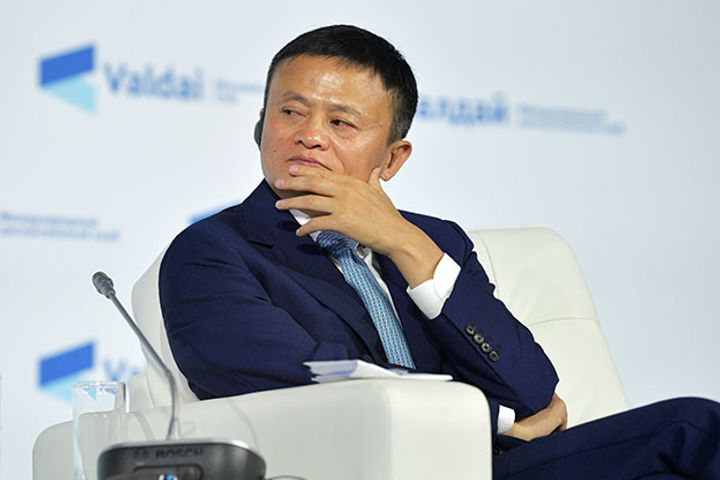 Alibaba Founder Jack Ma Outlines Seven Industries of the Future
Alibaba Founder Jack Ma Outlines Seven Industries of the Future(Yicai Global) Nov. 20 -- New retail, new finance, new manufacturing, new technology, new energy, happiness and health companies, or the '5Ns and 2Hs,' bear the greatest potential for future development, Jack Ma, founder of Chinese e-commerce juggernaut Alibaba Group Holding Ltd. [NYSE:BABA], believes.
Yunfeng Capital, the investment firm co-founded by Ma and Target Media founder David Yu, held its annual dollar investors conference at the Four Seasons Hotel Hong Kong in early November. Both founders took part in an engaging brainstorming session at the event, including the discussion of the world's future, China Economic Net reported, citing a social media post by entrepreneurial channel Hua Shang Tao Lue.
Accelerated integration of the internet, new technology and traditional businesses will be a dominant trend over the next five to 10 years, Yu said. "Internet [businesses] only make up 10 percent of total gross domestic product today, so how can they integrate with the remaining 80 to 90 percent going forward, not by combining online and offline activities, but in terms of integration based on Big Data and [artificial] intelligence? This represents the biggest opportunity for enterprises and investors."
"What has happened so far is just the beginning of a major market restructuring," Ma chipped in. "Upcoming technological revolutions will be completely disruptive and will affect all sectors. You won't find the answers in any books."
"It [the '5Ns and 2Hs' model] basically encompasses all the high-growth businesses of the next 30 years, and these present the biggest opportunities for us," Yu added.
Ma's thoughts on these seven industries and how they will present opportunities are noted below.
New Retail
Online, offline and logistics operations must fuse together to create a new retail model where offline businesses will migrate to online platforms and online businesses will penetrate offline markets, combining on- and offline operations with modern logistics services. The essence of the logistics business is not to create the fastest courier system, but to improve logistics management and minimize inventories for enterprises.
New Finance
Over the past 200 years, the financial sector has only offered funding to major corporations, which make up about 20 percent of companies. This used to be enough to keep the smaller companies afloat, but in future, lenders will need to strive to support these small- to medium-sized enterprises and young consumers. Data-based credit systems will catalyze genuine inclusive financial services worldwide, which will turn credit into wealth and give sensible entrepreneurs access to more funding.
New Manufacturing
Economies of scale and standardization have been the main themes of the manufacturing industry throughout the last two to three decades. Over the next 30 years, manufacturing firms will become increasingly intelligent and customizable. The Internet of Things, artificial intelligence and intelligent robots marked the start of a new transition after the 'retail revolution.' In future, machines will be powered by data, not electricity, and will adapt themselves to consumers' ever-changing needs.
New Technology
The rise of the mobile internet and mobile operating systems has pushed traditional computer operating systems to the side, with artificial intelligence replacing older machines. Constant development of new technologies based on Big Data and the internet will open up endless possibilities for people.
New Energy
In the past, mankind has relied on oil and coal for development. However, new energy will become the primary driving force and data will be the most valuable resource, making it the first artificial energy resource created by man. Data can lead to drastically different results if applied by different users, and its usefulness and value will continue to increase.
Entertainment
Alibaba has branched out into the entertainment market with the aim of turning entertainment into productivity. "'Mega entertainment' brings happiness. We have spent 11 years on this. Many Chinese people are not happy.
"For now, Alibaba doesn't want to make money from any entertainment businesses. We hope our mega entertainment services will facilitate cultural exchanges between China and other countries 10 years from now."
Health
"There are countless definitions of the health industry. My definition is that the health industry covers all health-related businesses. These companies can use the internet to create an online health sector. In a narrow sense of the term, online health refers to activities directly related to pharmaceutical manufacturing, sales and medical services."
The term can be more broadly defined as businesses present in the entire pharmaceutical industry chain, production and marketing, such as eco-agriculture, water purification, air purification and clean energy companies in upstream markets, green food processing, trading platforms and eco-friendly catering companies in the midstream and mobile healthcare, eldercare real estate, palliative care and funeral services downstream. Life insurance and health-related online wealth management products could also be regarded as 'spinoffs' of the online health industry.